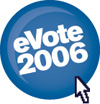
eVOTE 2006: Structural change | Upcoming election | College mandate | Q & As | Council duties | Provisional calendar | Candidates' tour | Council responsibilities Reports: 2005 Annual Report Highlights | Certification | Council | Accreditation | Investigations | Dispute Resolution | Hearings |
Structural change
Proposed changes dramatically alter governance
In one of his last acts as Education Minister, Gerard Kennedy proposed sweeping changes to College governance and the election process for a new Council.
Bill 78, an act to amend the Education Act, the Ontario College of Teachers Act and other education-related statutes, provides for increase the number of Council members to 37 from 31 (23 elected, 14 appointed) and require each Council member to sign an oath of office.
As well, the legislation would formally replace the Ontario Teacher Qualifying Test with a mandatory New Teacher Induction Program of support for newly certified and permanent full- and part-time teachers in publicly funded schools.
In a letter to Council Chair Marilyn Laframboise, Ontario's Minister of Education asked the College to prepare regulation amendments to enable it to proceed with its 2006 fall election. He told the Chair that if the College did not produce a regulation meeting his requirements within 60 days, the government would invoke its power to make the regulation unilaterally.
Anticipating early acceptance of the legislation, the Minister asked the College to make a priority of removing the provisional requirements for certification for new teachers.
Kennedy required that regulation amendments:
- define a classroom teacher as a College member in good standing and one who is employed as part of a board's regular teaching staff who does not hold or is not seconded to any other position outside of the regular teaching staff
- define a part-time teacher as one who “has taught a minimum of 20 days during the school year ending immediately preceding the election year”
- require that all elected positions on Council – except those designated for principal, supervisory officer, private school and faculty of education – be classroom teachers
- assign additional elected spots as regional positions on Council.
To “strengthen the fairness and transparency of the nominations and elections process,” Kennedy required the College Registrar to set a pre-election communications plan with a pre- and post-nomination phase.
During the pre-nomination phase the College will provide members with specific information:
- the election process, electoral regions and categories
- the College's governance structure and mandate
- Council member job responsibilities, such as committee work and expected time commitments
- The College's compensation and expenses policy
- the type of issues Council addresses
- the duty of the College to serve and protect the public interest.
The pre-nomination phase is also to provide potential candidates with an opportunity to tour the College.
When the nominations phase is over, the minister wants the College to publish and disseminate candidate information to all members. This will include candidates' attestations, biographical statements and relevant information from their nomination forms.
The College is also to create a standardized communications and advertising plan for the election. This plan will provide for a dedicated elections phone line to support candidates with information during the election as well as a variety of means and at least three opportunities for candidates to provide information and communicate with members.
Candidates' statements of attestation must report whether they belong to a teacher union or association and include a declaration that they will resign from any elected or appointed position they hold within that organization before taking a seat on Council, if they are elected.
The Minister also wants candidates to acknowledge in writing that, if elected, they will not take direction from teacher federations or other teacher advocacy organizations.
Nomination forms will include a candidate's:
- teaching experience
- current teaching assignment
- federation involvement, if any
- other education, profession-related activities or memberships, if any
- participation in professional development and personal professional interests, if any
- statement describing his or her understanding of the duty to serve and protect the public interest.
The Minister said he wants the regulations to stipulate that no College member can be elected to Council while they are an employee or elected or appointed official of any of the following:
- Ontario Ministry of Education
- Ontario Teachers' Federation
- Elementary Teachers' Federation of Ontario
- Ontario Secondary School Teachers' Federation
- Association des enseignantes et des enseignants franco-ontariens
- Ontario English Catholic Teachers' Association
- Ontario Principals' Council
- Catholic Principals' Council of Ontario
- Association des directions et directions adjointes des écoles franco-ontariennes
- Ontario Public Supervisory Officials' Association
- Ontario Catholic Supervisory Officers' Association
- Association des gestionnaires de l'éducation franco-ontarienne
- Council of Directors of Education.
Elected Council members must agree to perform their duties impartially “to the best of their skill and judgment without taking direction from any of the above noted organizations,” the Minister's letter to the Council Chair says.
After the election, those elected must report in writing to the Registrar the amounts and sources of all election contributions.
Members who do not meet the new criteria will be disqualified from serving on College Council.
As this issue goes to press Bill 78 is still in front of the Standing Committee on Social Policy and is subject to change. If the bill is not approved by the legislature by June 1st, Council election information may change significantly.
 Regulations required to conduct the election are also still under discussion
between the College and the Ministry of Education and so are also subject
to change.
Regulations required to conduct the election are also still under discussion
between the College and the Ministry of Education and so are also subject
to change.
For up-to-date information, refer to www.oct.ca and look for the logo.





